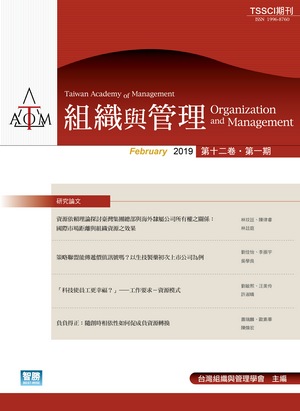Hot News
| 中文篇名 |
負負得正:隨創時相依性如何促成負資源轉換 | |
|---|---|---|
| 英文篇名 |
Two Nagatives Makes a Positive: How Interdependency Enables Conversion of Negative Resources within Entrepreneurial Bricolage | |
| 作者 | ||
| 中文摘要 |
面對制約時,企業需要具備創業精神,施展隨創手法,拼湊手邊僅有的資源,以無中生有。隨創文獻雖零散地記載各式重組、活化與建構資源等方式,我們卻仍未能深入探討如何轉換看似累贅的負資源。本文檢視一家小型科技公司如何在困境中開發出各式新通路,進而演化為新營運模式。本案例解析制約中的負資源轉換,點出當企業無可避免而擁有負資源時,可以嘗試以創意的轉換與重組,以改變資源的價值。學理上,本研究分析資源性質的改變如何影響資源價值的轉換過程。相對於資源拼湊與建構的主流論述,本研究解釋創業者與弱勢夥伴如何以合作隨創的做法,促成資源流動與轉換資源樣貌。當企業能夠辨識雙方資源的相依性時,便能解讀負資源的潛力,找出轉換資源的各種契機。實務上,本文提出制約中整合劣資源的方式。當企業手邊僅有負資源時,仍可以施展隨創,只要能重新解讀制約,由危機中找出轉機,翻轉資源價值。理解資源的相依性,不僅可豐富隨創的多元思維,更可以為企業於劣勢中創新,將累贅變成資產。 | |
| 英文摘要 |
When facing constraints, firms need to become entrepreneurial and employ methods of bricolage in order to making-do with limited resources, creating something from nothing. Although the bricolage literature describes various ways to recombine, activate or reconstruct resources sporadically, we have not yet explored the conversion of negative resources, which is considered as liabilities to firms. This article examines how a small-sized technology firm develop marketing channels in adversary situations, while evolving its operational model. The case study analyzes the conversion of negative resources within constrained context, and highlights that, when firms inevitably behold negative resources, they could attempt to alter the value of resources by means of creative conversion and recombination. Theoretically, this article explains how the change of resources’ quality could influence the conversion of resources’ value. In contrast to the main stream argument of bricolage, which is based on resource making-do and reconstruction, our study illustrates how entrepreneurs could work with low-power partners and engage in collaborative bricolage so as to enable resource flow and convert resource patterns. When firms could recognize the mutual dependency between two parties, it is possible to interpret the potential of negative resources, while identifying various opportutnities in converting the value of such resources. Practically, this article suggests methods of integrating seemingly inferior resources under constraints. When firms have merely negative resources at hand, they could still exercise bricolage if they could reinterpret constraints so as to spot opportunities from crises while flipping the value of resources. Understanding interdependency among resources not only could enrich the intellectual diversity of bricolage but also would help firms develop innovative solution during disadvantage, turning liabilities into assets. | |
| 關鍵詞 |
合作隨創、負資源、弱勢夥伴、資源相依性、資源轉換、collaborative bricolage、negative resource、low-power partner、resource interdependency、resource conversion | |
| 刊名 | ||
| 期數 | ||
| 起訖頁 |
127-171 | |
| 出版單位 | ||
| DOI | ||
| QRCode |
| |
| 上一篇 |



